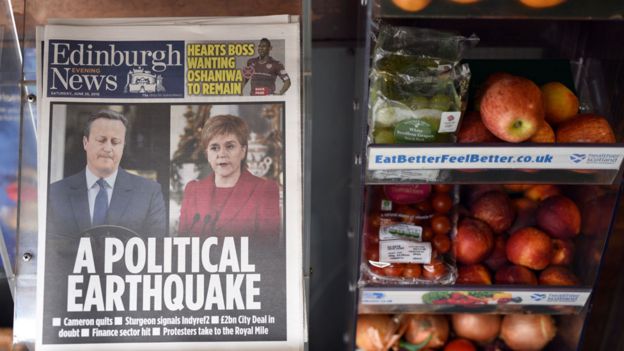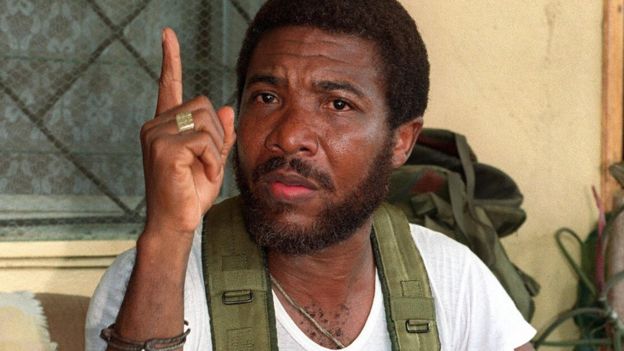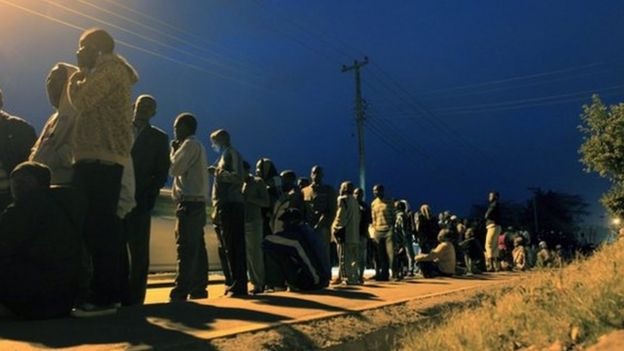EDITED BY KALAHAN DENG
The UK could now qualify to join the African Union (AU).
If after voting to leave the European Union the UK is feeling lonely and in need of the company of another community of nations, it should consider the AU.
The UK has been exhibiting qualities that are very familiar to Africans, including “tribalism”.
The tribe from the northernmost part of the UK, otherwise known as Scotland, has threatened to break away following the Brexit vote.
The Scottish people overwhelmingly voted to remain in the EU, but their voice was drowned out by the southern tribes, where the majority voted to leave.
UK cohesion could face further challenges if Scotland goes ahead with a new referendum to decide its future inside the UK.
Africans are often accused of tribal politics, so the UK would be quite at home in the African Union.
‘Political novices’
We are also seeing a leader, albeit of the opposition, hanging on to power despite sustained pressure for him to quit.
 Image copyrightAFP
Image copyrightAFPLabour leader Jeremy Corbyn, who is accused of performing badly in the referendum, is likely to face a leadership challenge after a vote of no confidence by MPs within his party.
But he says he will remain in office, arguing that he was elected by a majority of Labour members.
Africa has its fair share of leaders clinging to power for decades despite opposition to their rule.
The current chaos, backstabbing, attempted leadership coups, dark room deal cutting, resignations, sackings and instant appointments inside UK political parties makes African leaders look like political novices.
So in this respect, the UK might bring a transfer of knowledge to the AU.
Hate and racism have also come out from the shadows to torment the UK, and Africa knows all too well the dangers of hate speech and hate crime.
Since supporters of the Leave campaign won the referendum, there has been an increase in reports of hate crimes in the UK, with the police looking into incidents.
Addressing parliament, British Prime Minister David Cameron acknowledged the problem and pledged more money to the police to tackle it.
Campaigners on both sides of the Brexit issue used scare tactics in an attempt to sway the vote.
Although violence was not used, some voters felt compelled to vote one way or the other without proven facts to support the fear.
We know of a number of leaders in Africa who have won elections through threats and intimidation.
In 1997, during the first election after Charles Taylor won his seven-year rebel war in Liberia, the people voted him president out of fear that if he lost, he would resume the fighting.
 Image copyrightAFP
Image copyrightAFPIn reference to the former rebels who were at the time seeking power by the ballot, some Liberians openly said: “You killed my ma, you killed my pa, but I’ll vote for you.”
‘Ignoring the young’
The referendum result itself is not legally binding in UK law and it alone does not trigger the UK’s departure from the EU – parliament may still debate and be asked to approve the process of leaving Europe.
Again, Africans are very familiar with this phenomenon – they go to a referendum poll and express their views on an issue only for MPs to sit in the house and decide that the people misspoke.
Then there is the question of the youth – there was a big contrast of opinion amongst different age groups in the Brexit vote.
 Image copyrightREUTERS
Image copyrightREUTERSThe majority of young people wanted the UK to remain in Europe, but they did not vote in large numbers. The older generation voted to leave.
In Africa, the youth are the majority but their voice and presence in power is in the minority.
I grew up being told that the youth are the leaders of the future.
Now my teeth are almost falling out, while the bald patch on my head is starting to mimic a solar panel and I am still waiting for that future.
‘African solutions’
So UK, welcome to the African Union.
And once you join, you will benefit from our African solutions for African problems, which might suit Anglo-problems too.
 Image copyrightAFP
Image copyrightAFPIf you need to rebuild national unity after such a divisive poll, Kenya can help with its experience after the 2007 vote.
South Africa too can offer you some guidance about restorative justice through the work of its Truth and Reconciliation Commission.
And if you are worried about how to keep Scotland happy in the UK, Tanzania could share its experience of maintaining the union between mainland Tanganyika and Zanzibar.
 Al-anwar Newspaper English news in Australia
Al-anwar Newspaper English news in Australia